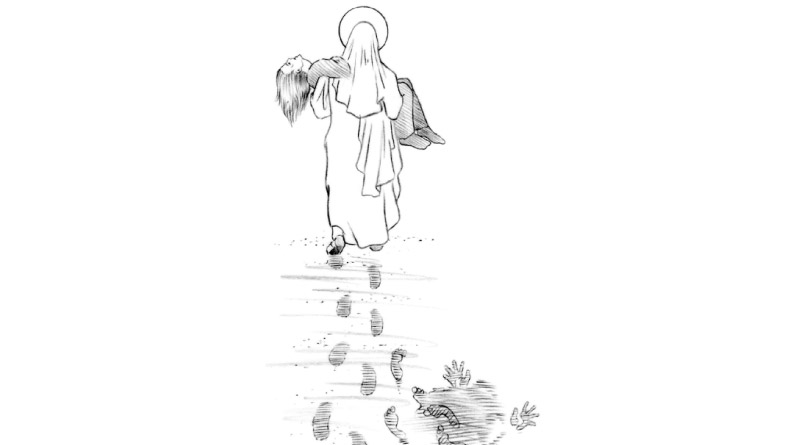Praying the Litany as a Lenten Discipline
By Sue Careless
IF YOU are resolving to pray more through Lent, you might consider using the majestic Litany in the Book of Common Prayer. This beautiful intercessory prayer has a sweep and thoroughness that few others can match.
“Litany,” in Greek, means prayer or supplication. But in English it refers to a form of prayer in which there are a series of short petitions said or sung by the prayer leader to which the congregation makes a number of recurring responses, such as “Good Lord, deliver us” or “ We beseech thee, good Lord.”
While designed for corporate worship, it is also well worth praying in your own personal devotions. It can be found on page 30 of the Prayer Book or online at prayerbook.ca/resources/bcponline/litany/. Traditionally it was to be prayed at least once a month on a Sunday, during penitential seasons and during ordinations.
While the litany was originally a penitential procession that might occur outside the church building, it is more common now to pray the litany inside the church. The priest and choir may process for the opening portion of the litany and then join the congregation kneeling in the nave of the church.
We know of Christian litanies from as early as the fourth century in Antioch. Our Prayer Book Litany was the first rite that Thomas Cranmer, the chief architect of The Book of Common Prayer, translated from the Latin into English and revised and reworked in 1544. So it retains more of its medieval grandeur than other services that were translated and restructured just a few years later for the first Prayer Book of 1549.
Penitential Adoration
There are six sections to the Litany. In the opening section we praise each person of the Trinity and ask each for mercy.
O GOD the Father, Creator of heaven and earth: have mercy upon us.
O God the Father, Creator of heaven and earth: have mercy upon us.
O God the Son, Redeemer of the world: have mercy upon us.
O God the Son, Redeemer of the world: have mercy upon us
O God the Holy Ghost, Sanctifier of the faithful: have mercy upon us.
O God the Holy Ghost, Sanctifier of the faithful: have mercy upon us.
O holy, blessed, and glorious Trinity, three Persons and one God: have mercy upon us.
O holy, blessed, and glorious Trinity, three Persons and one God: have mercy upon us.
Adoration and confession, awe and humility, are juxtaposed in echoing refrains. You could easily memorize this first section and pray it quietly as you walk about your community.
Sometimes I think we understand the Trinity best in prayer. Here we glimpse something of the intimate personhood of the Trinity; we also see something of their functions or roles, their job descriptions, if you will. The Father is the Creator of heaven and earth; the Son is the Redeemer of the world; and the Holy Spirit is the Sanctifier of the faithful. But we need to remember they are persons too, not just forces. Some wish to speak of the Trinity only as Creator, Redeemer and Sanctifier, which they are, especially in relationship to humankind, but they are persons, too, who relate to each other in a dynamic, threefold community as Father, Son and Holy Spirit.
On earth we Christians are sinners forgiven, but still sinners, works in progress. The opening invocation expresses an attitude of humility and deep reverence before God as we seek his continual mercy. Dr. Robert Crouse, a Canadian theologian, aptly calls this attitude “penitential adoration.”
Next in the brief second section, we ask God to “remember not” our offences nor the sins of our ancestors, but by his “most precious blood” to “Spare us, Good Lord.”
Some criticize the Book of Common Prayer as being too penitential. And certainly the Litany is, in part, penitential. Yet whenever the Prayer Book speaks of sin and confession, it also speaks of forgiveness and redemption. In the last section of the Litany we shall ask for “true repentance” and “the grace of the Holy Spirit, to amend our lives.”
The Four Last Things
Nor does the Litany shy away from what theologians call the Four Last Things: Death and Judgement, Heaven and Hell. Most secular people only take death, the first of the four, seriously. For them, death is all there is. But Christians believe there will also be a day of judgement, after which some will go to everlasting condemnation and others, by faith in Christ’s redeeming blood and not by their own merits, to everlasting joy. So we pray that God will deliver us “from the crafts and assaults of the devil, from God’s wrath and from everlasting condemnation.” Later we will pray for God to deliver us “in the hour of death, and in the day of judgement.”
In the Lord’s Prayer we pray “deliver us from evil.” In this third section of the Litany we name the various evils and spiritual dangers from which we earnestly desire God to save us. This list could also be used when we are examining our conscience: blindness of heart; pride; vainglory; hypocrisy; envy; hatred; malice; uncharitableness; uncleanness in thought, word and deed; the deceits of the world, the flesh and the devil; false doctrine; heresy; schism; hardness of heart and contempt for God’s Word. From all these temptations we pray again and again, “Good Lord, deliver us.”
Cranmer changed the medieval response “Deliver us, Lord” to “Good Lord, deliver us,” reminding us that our God is indeed good.
We are not only vulnerable spiritually, but also physically–so we entreat God to deliver us, “from lightening and tempest; from earthquake, fire and flood; from plague, pestilence, and famine.” Plague and pestilence may sound rather medieval to comfortable, middle-class Canadians, until you start thinking about AIDS and SARS and Avian Flu. The 474-year-old Litany still does speak into the 21st century.
We also pray to be delivered from “battle and murder, and from sudden death.” While none of us wants an agonisingly long drawn-out death, here “sudden death” means a death for which we are not spiritually prepared. We need to have our spiritual house in order.
Christians stress that we are saved not by our own merits but by Christ’s obedient death upon the cross. But we are actually saved by his whole obedient life as well, right from his Incarnation. The fourth section of the Litany lays it out for us:
“By the mystery of thy holy Incarnation; by thy holy Nativity; by thy Baptism, Fasting and Temptation; by thine Agony and bloody Sweat; by thy Cross and Passion [suffering]; by thy precious Death and Burial; by thy glorious Resurrection and Ascension; by thy sending of the Holy Spirit; By thy heavenly Intercession [Jesus in heaven even now prays for us!]; and by thy Coming again in glory, Good Lord, deliver us.”
The next petition speaks of our lives: “In all times of tribulation; in all times of prosperity; in the hour of death, and in the day of judgement; God Lord, deliver us.” It might strike you as odd that we ask God to deliver us “in all times of prosperity.” Yet it is often during the good times that we forget God and lose our spiritual bearings. So we pray not to lose our spiritual intimacy with God in the midst of success, as sadly the Israelites did once they entered the Promised Land. (Read Deuteronomy 6:10-12.)
Mighty and Meek
In the fifth and longest section we intercede for both the powerful and the weak. We pray for those who rule over us and serve us in church and state. And we pray for the vulnerable: travellers, women in labour, the sick and young children, prisoners, widows and orphans, and those who are desolate and oppressed. We pray for those who are spiritually lost, weak, or deceived, and ask that God would “beat down Satan under our feet.” The Eastern Orthodox symbolically spit on the devil in their Baptism service. Anglicans, in the Litany, call for trampling on Satan.
Forgiveness is a distinguishing mark of Christianity, so we ask God “to forgive our enemies, persecutors, and slanderers and to turn their hearts.” We ask God to forgive us and also to forgive those who have sinned against us. Does this comprehensive litany leave anything out?
It closes with a beautiful series of petitions asking Christ our Lord, the Son of God, the Lamb of God, to hear us and have mercy upon us. This is repeated not because we doubt God’s mercy but because, as forgiven creatures, we need always to be in a state of humility and grace before our Maker, a state of penitential adoration that we spoke of earlier.
The Litany proper closes with the Lord’s Prayer, the collect of the day, the Prayer of St Chrysostom and “The Grace,” the blessing of Second Corinthians 13:14. But in a penitential season such as Lent and in times of trouble a short service called A Supplication (on p. 35) is added just before the Prayer of St Chrysostom.
In Times of Devastation:
A Supplication
How should we pray when our city or nation is plunged into a time of terror or grief, when evil seems to stalk the land? Perhaps a natural disaster has struck–a fire, flood, or earthquake, a famine or disease. Perhaps the tragedy is man-made involving war, terrorism, or bloodshed. Whatever the devastation, God tells us to call upon him in the day of trouble, and so we do.
No one wants trouble, but when it comes, we want God to walk with us through it. God promises he will: “When he calls to me, I will answer him; I will be with him in trouble, I will rescue him and honour him” (Psalm 91: 15). So in A Supplication we call upon God to “arise” like a mighty warrior (Psalm 68:10). Three times we plead, “O Lord, arise, help us, and deliver us for thy Name’s sake/ for thine honour.” We cast ourselves upon his care, not because we deserve his protection by virtue of our own goodness but because God has mercifully accepted us as his people.
We recall God’s deliverance in times past, and ask him to act powerfully in our own day. We unburden all our “afflictions, sorrows, sins, infirmities, troubles, adversities, persecutions and the evils worked against us.” Our God is both a sin-bearer and a sorrow-bearer, a God of mercy and of consolation. Isaiah tells us the Messiah “is a man of sorrows and acquainted with grief… Surely he hath borne our griefs and carried our sorrows” (Isaiah 53:3, 4). So we cry out to God in a series of petitions including:
From our enemies defend us, O Christ;
Graciously look upon our afflictions.
Pitifully behold the sorrows of our hearts;
Mercifully forgive the sins of thy people.
Next follow two collects. In the first, we ask God to turn all evil away from us, even the evil we have brought upon ourselves. We also ask that we may completely trust him in the midst of all our troubles. In the second collect, we ask “that those evils which the craft and subtlety of the devil or man worketh against us, be brought to nought” (come to nothing) and “be dispersed,” and that we may be hurt by no persecutions.
We can meet God even in the abyss of despair. He walks with us through both calm and crisis. He draws near to us in times of trouble when perhaps nobody else seems near. The Litany and Supplication contain prayers deep enough and strong enough to bear us and those we love through the turbulent waters of life. TAP
Adapted and expanded from Discovering the Book of Common Prayer: A Hands-On Approach Volume I by Sue Careless, St Peter Publications 2003. To learn more about Sue Careless, visit the “About Us” page.




